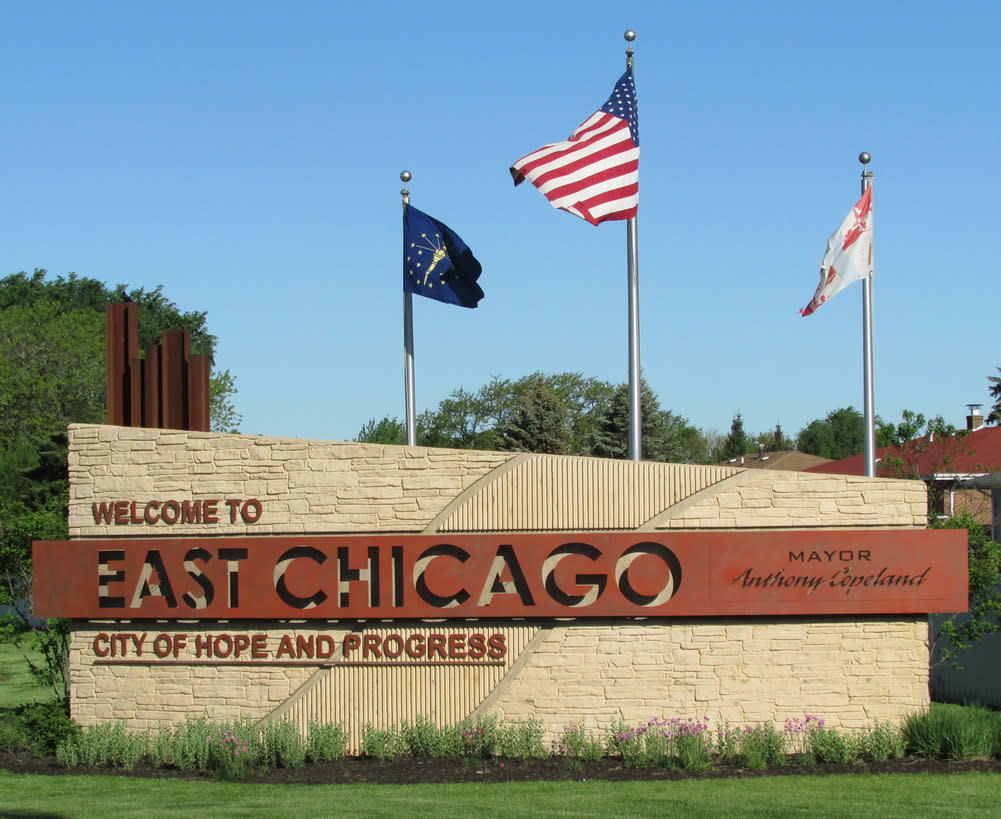Indiana AG Todd Rokita sues East Chicago over ‘sanctuary city’ policies

- Oops!Something went wrong.Please try again later.
A lawsuit filed by the Indiana Attorney General against the City of East Chicago seeks to repeal a local "welcoming city" ordinance. (Photo courtesy City of East Chicago)
Indiana Attorney General Todd Rokita is suing the City of East Chicago for what he claims are violations of the state’s ban on “sanctuary cities.”
The complaint, filed in Lake County Superior Court, alleges that an East Chicago ordinance — adopted in 2017 — violates Indiana law by “restrict[ing] taking certain actions regarding information of citizenship or immigration status and limit[ing] or restrict[ing] the enforcement of federal immigration laws to less than the full extent permitted by federal law.”
The lawsuit quotes the city’s code, which specifically bars law enforcement from:
requesting information about — or otherwise investigating or assisting in — the investigation of a person’s citizenship or immigration status
detaining a person based upon an immigration detainer, administrative warrant, or “[a]ny other basis that is based solely on the belief that the person is not present legally in the United States, or that the person has committed a civil immigration violation”
working with federal agencies “to support or assist in any capacity with immigration enforcement operations,” or cooperating with the U.S. Immigration and Customs Enforcement (ICE) unless presented with a criminal warrant
“This week, my office filed a lawsuit against East Chicago because its leaders continue to operate their city as a sanctuary city, giving safe harbor to illegal aliens, against federal and state law,” Rokita said in a statement Tuesday. “We have a new statute that supports the rule of law thanks to the leadership of the General Assembly and I intend to enforce it because illegal immigration is unfair to the good people of this state and those who worked hard to enter our country legally. As we continue to evaluate other local governments, this may not be the last lawsuit we file on this issue. Stay tuned.”
Story continues below.
A 2011 Indiana law bans local governments from restricting cooperation with federal officials over citizenship or immigration information.
The Indiana Supreme Court blocked a group of citizens from suing over a Gary ordinance in 2022, saying they didn’t have legal standing. The state’s highest court dismissed the lawsuit which claimed Gary’s policy of prioritizing local public safety needs and protecting the rights of immigrants unlawfully violated Indiana’s sanctuary cities law.
But state lawmakers followed up earlier this year by authorizing the attorney general to enforce the law. Senate Enrolled Act 181, which took effect July 1, permits the attorney general to file a lawsuit against any Indiana college, university or unit of local government that is not enforcing state laws banning sanctuary cities.
According to the complaint, Rokita sent a letter to members of the East Chicago Common Council on May 14, asking whether the ordinance in question was still in effect. His office also demanded its repeal if it was still in effect and warned of legal consequences if the “unlawful ordinance” is not repealed.
The Common Council has not responded to the letter or repealed the ordinance, Rokita said in the lawsuit.
In 2017, a number of cities across the U.S. passed “welcoming city” ordinances in opposition to then-President Donald Trump’s immigration policies. Such ordinances direct government officials not to provide information about a person’s immigration status to federal immigration authorities.
In May, Rokita also threatened legal action against the cities of Gary, West Lafayette and Monroe County, telling them to repeal similar policies “violating Indiana law.”
No lawsuits have been filed by Rokita’s office against those other cities, however.
GET THE MORNING HEADLINES DELIVERED TO YOUR INBOX
The post Indiana AG Todd Rokita sues East Chicago over ‘sanctuary city’ policies appeared first on Indiana Capital Chronicle.

